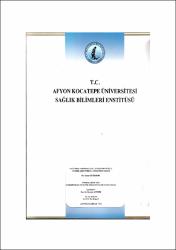Akut ishal yakınmalı çocuklarda rotavirus, enterik adenovirus ve nörovirus sıklığı
Citation
Küçükkurt, Şeyma. Akut İshal Yakınmalı Çocuklarda Rotavirus, Enterik Adenovirus ve Nörovirus Sıklığı. Afyonkarahisar: Afyon Kocatepe Üniversitesi,2010.Abstract
Giriş ve amaç: Enterik virüsler (özellikle Rotavirüs, norovirus ve adenovirüs) bakteriyel olmayan akut gastroenteritlerin en sık nedeni olarak bildirilmiştir. Bu çalışmada gastroenteritli çocuklarda neden olan viruslerin sıklığının belirlenmesi amaçlanmıştır.
Yöntem: Çalışma, Afyon ilindeki ishal etkeni virüsleri belirlemek üzere Ocak ve Aralık 2009 tarihleri arasında toparlanan örneklerde gerçekleştirilmiştir. Altı yaş altında (yaş ortalaması 2.18 ± 1.64 yıl) 150 çocuktan alınan dışkı örnekleri standart kültür yöntemleri ile patojen bakteriler ekarte edildikten sonra ELISA ile rotavirus / adenovirus ve norovirus (Ridascreen ve Biomeriux) açısından test edilmiş, yine 95 hasta örneği de RT PCR ile rotavirus açısından değerlendirilmiştir.
Bulgular: 2009 yılında Afyonkarahisar ilinde gastroenterit nedeniyle hastaneye getirilen 6 yaş altı 150 çocuğun %40’ında rotavirus, 92 çocuğun %22.8’inde norovirus ELISA ile pozitif saptanmış, rotavirusun RT PCR ile araştırıldığı 95 olgunun da %15.8’inde pozitiflik belirlenmiştir. Viral gastroenterit ile gelen çocukların % 6.5’unda da karışık norovirus-rotavirüs enfeksiyonu gözlenmiştir. Çalışılan 122 hastanın altısında adenovirus pozitif bulunmuştur(%4.91). Adenovirus, Rotavirus birlikte pozitifliği 1 örnekte, Rotavirus, Nörovirus beraberliği 4 örnekte bulunmuştur.
Tartışma: Rotavirus, gastroenteritlerin halen en sık etkendir. Norovirus kusmanın ön planda olduğu olgularda daha sık etken olabilmektedir. Norovirus için enfeksiyonun şiddeti düşük olmakla beraber rotavirus ile ortak enfeksiyonda artış gözlenmektedir. Background and aims: Enteric viruses(especially rotaviruses, noroviruses, adenoviruses) that have been reported as a cause of nonbacterial acute gastroenteritis. This study aims to determine the prevalence and the distribution of viruses responsible for gastroenteritidis in children.
Methods: A epidemiological study on common diarrheal viruses was conducted in Afyon City, Turkey between January and December 2009. One hundred and fifty faecal samples from children under 6 years of age(mean age, 2.18±SD 1.64 years, range: 1 – 72 months)(negative for the presence of pathogenic bacteria by standard culture methods) were tested by ELISA(Ridascreen and Biomeriux) and RT PCR methods for detection of rotavirus.
Results: Noroviruses were detected in 22.8% of 92 children (<6 years of age) and rotavirus were detected in 40 % of 150 hospitalized for gastroenteritis in Afyonkarahisar, Turkey, during 2009; rotaviruses were detected in 15.8 % in 95 children with RT PCR. Of children with viral enteritis, 6,5% had a mixed norovirusrotavirus infection. The frequency of adenovirus were 6 of 122 patients(4.91%). Adenovirus plus rotavirus positivity with one case, Rotavirus plus Nörovirus draw in four samples were found.
Conclusions: Rotavirus is still the most common cause for gastroenteritis. Norovirus may be agent in patient with vomiting prominent. The severity of infection was lower for norovirus than for rotavirus but increased in co-infection.
Collections
- Yüksek Lisans Tezleri [660]



















